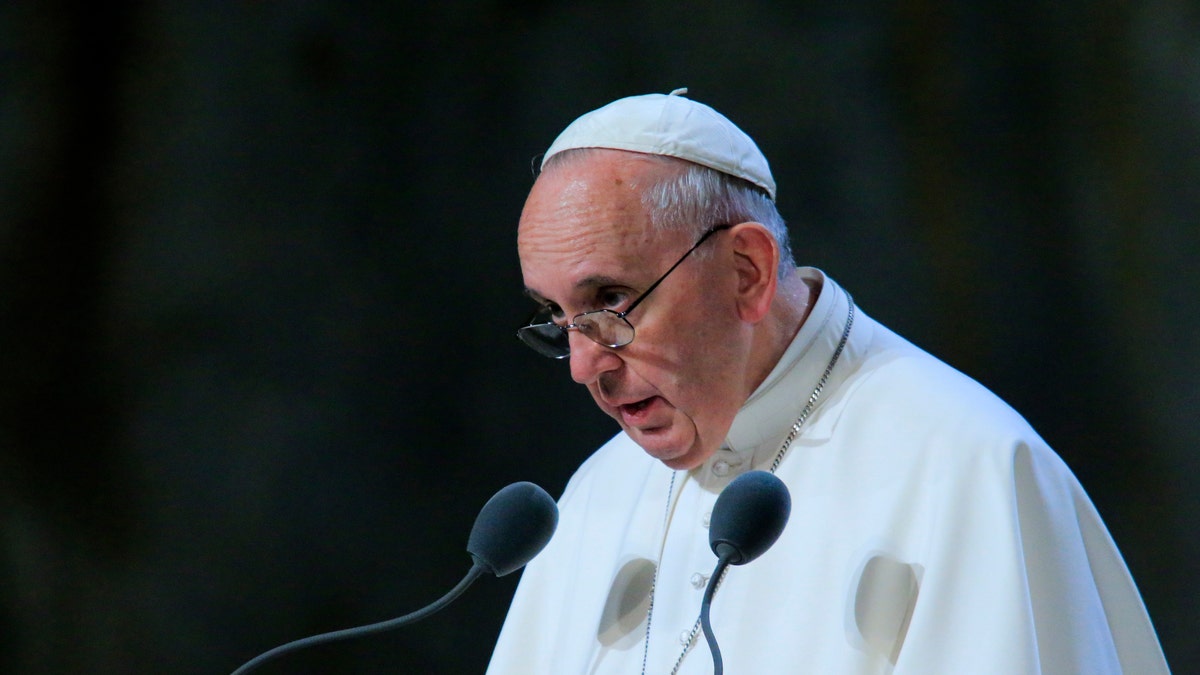
WASHINGTON, DC - SEPTEMBER 25: Pope Francis speaks to attendees inside of the 9/11 Memorial Museum September 25, 2015 in New York City. Pope Francis is on a six-day trip to the United States, which includes stops in Washington DC, New York and Philadelphia. (Photo by Eduardo Munoz-Pool/Getty Images) (2015 Getty Images)
Pope Francis’ decision to speak Spanish in the majority of his public appearances is underscoring the increasing importance of the nation’s Hispanic population and the growing use of the Spanish-language in the United States.
During his visit, the Argentinian pontiff is delivering 14 of his 18 speeches in his native tongue, and while it’s true it’s the language he’s most comfortable using, some in the Catholic Church believe it is a calculated decision to appeal directly to America’s Hispanic population, who make up a third of U.S. Catholics and 60 percent of America’s Catholics under the age of 18.
“It’s a call to the power of the Hispanic community to reinvigorate Catholicism in the United States,” said Montse Alvarado, a spokesperson for Catholic Voices. “This is his target audience. He is speaking to the people he’s relying on to populate the next generation of American Catholics.”
The pope is fluent in three languages - Spanish, Italian and German - but as the world has seen, he can manage to speak some English and read it, as he did on Thursday when he delivered a 45-minute speech before a joint session of Congress.
Alvarado suggests the pope has chosen to speak Spanish to Americans to reinvigorate Hispanic Catholics at a time when many are fleeing to other faiths. A Pew Research Center study finds 8 in 10 Hispanic Catholics use mostly Spanish or are bilingual.
“I don’t think there are coincidences in the way he speaks,” Alvarado said. “He’s a smart man.”
The pope’s use of the Spanish language is also a reminder that the United States is the world’s second largest Spanish-speaking country – ahead of Colombia and Spain, and just behind Mexico. By 2050, the U.S. could have more Spanish speakers than any other country.
The pontiff’s visit comes at a time when bilingualism and Spanish speaking in the United States has been thrust onto the presidential election campaign trail.
“While we’re in this nation we should be speaking English,” Donald Trump stated earlier this month, reiterating his belief that fellow presidential candidate Jeb Bush should speak English, not Spanish, when addressing Americans.
The debate over making English the official language in the U.S. has heightened in recent years, overlapping with the immigration debate. In fact, as the number of non-English speakers rises in the country, a growing number of states and counties have adopted English as their official language.
The U.S. is one of the few countries in the world that does not have a national official language, and with the nation’s fastest growing minority, Latinos, steadily gaining influence in American society, the number of bilingual speakers continues to go up. About 20 percent of Americans speak a language other than English at home, according to the U.S. Census bureau.
Alvarado also believes the Spanish speaking pontiff’s choice to use Spanish could also have an effect on Hispanic voters.
“It’s going to have a political effect, and he probably doesn’t realize it,” she said. “He made a plea to talk through immigration issues and see human beings for who they are. All these people are speaking Spanish.”




















